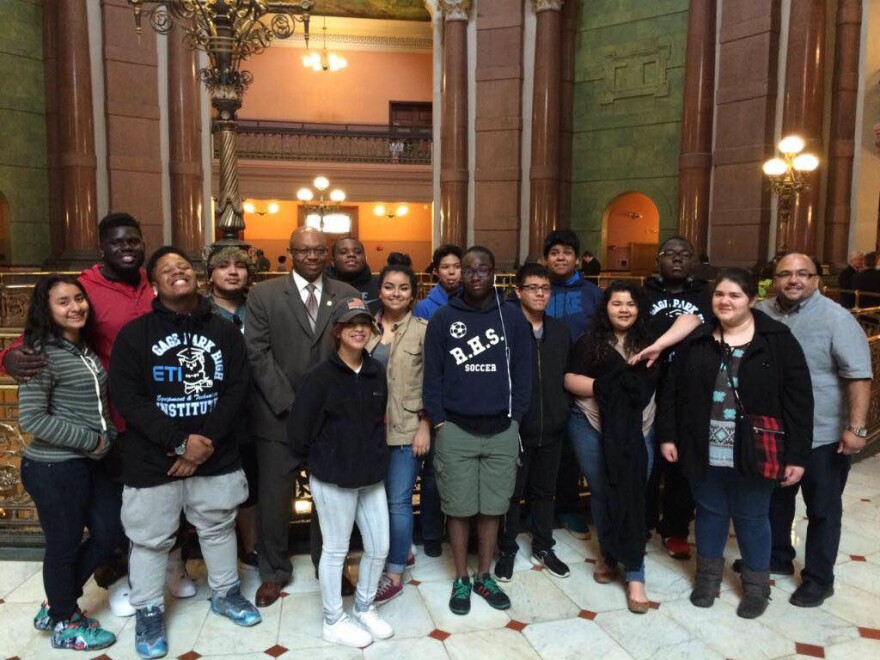In May, we reported on the passage of legislation that would limit school suspensions and expulsions, and introduced listeners to some of the young activists who lobbied lawmakers for two years to get the bill passed. This week, Gov. Bruce Rauner signed it into law. Below is the press release from the activist group VOYCE, or Voices Of Youth in Chicago Education.
Governor Rauner Signs Groundbreaking Law Disrupting “School-to-Prison Pipeline”
Legislative effort led by high school students takes aim at harsh and unjust school discipline practices
CHICAGO – Illinois Governor Bruce Rauner (R) has signed into law what is widely considered the most sweeping effort in the nation to rein in punitive school discipline practices that have pushed disproportionate numbers of African American students out of school, typically for minor offenses.
Senate Bill 100, which was passed with bipartisan support led by Senator Kimberly Lightford and Representative Will Davis this past spring, prioritizes the creation of safe and orderly schools while addressing excessive use of the most severe forms of discipline. Under the legislation students can only be suspended, expelled or referred to an alternative school if all other "appropriate and available" alternatives are exhausted. In other words, suspensions and expulsions become the last resort, rather than the first response.
Additionally, the bill provides struggling students with academic and behavioral supports, and promotes fairness by holding public schools and charter schools to the same standards for school discipline for the first time in the state’s history.
“Throughout the country, educators and policymakers are coming to the realization that harsh discipline policies are undermining their efforts to promote student achievement," said national school discipline and educational equity expert Pedro Noguera, a professor at New York University. "Illinois’ SB 100 represents a big step forward in that it will allow schools to devise more creative approaches to student discipline while still maintaining safe learning environments."
The effort to pass SB 100 was led by VOYCE (Voices of Youth in Chicago Education), a group of high school students from Illinois. They created the bill in 2012 to address the impact of out-of-school suspensions and expulsions on their peers and schools. Through their research, VOYCE youth leaders found that Illinois students have lost over one million instructional days per year as a result of suspensions, expulsions and arrests.
Illinois has one of the widest disparities between suspended black and white students in the country. According to the Department of Education’s Office of Civil Rights, in the 2012-13 school year, Chicago Public Schools issued 32 out-of-school suspensions for every 100 black students compared to just five for every 100 white students. For over two years, dozens of VOYCE students traveled regularly to Springfield to educate their legislators on how disciplinary practices were pushing students out of school and into the juvenile and criminal justice systems.
Overly harsh discipline approaches are particularly harmful to students of color and do not promote school safety or academic achievement. Last year, the U.S. Departments of Education and Justice issued joint guidelines on school discipline practices and warned against the discriminatory use of “zero-tolerance” policies on students of color and those with disabilities. The guidelines call on school districts to focus on creating positive school climates and to use suspensions and expulsions only as a last resort.
"In schools all across our state, African-American students are disciplined more harshly than white students,” said Senator Kimberly Lightford, the bills chief sponsor. “As legislators, we saw that this was a serious problem--and that it required our immediate attention.”
The law will officially go into effect September 2016. In the meantime, as schools open in the coming weeks, Illinois districts will start the process off reforming their harsh discipline practices.
“We expect that schools will begin implementing alternative discipline approaches this coming school year that emphasize student-centered social-emotional supports and limit the loss of instructional time when discipline issues arise,” said Amina Henderson, a youth leader from Southwest Organizing Project in Chicago.
“For too long, harsh school discipline practices have contributed to the under-education and over-criminalization of young people, and especially youth of color,” said Dalia Mena, an 18-year-old member of VOYCE from Communities United in Chicago, who made numerous trips to Springfield with her peers in support of the bill. “Illinois now provides more tools for schools to create environments where all students are valued and supported in their learning and development.”
“Thanks to SB 100, Illinois is a national leader with a model piece of legislation,” said Senator Lightford.







